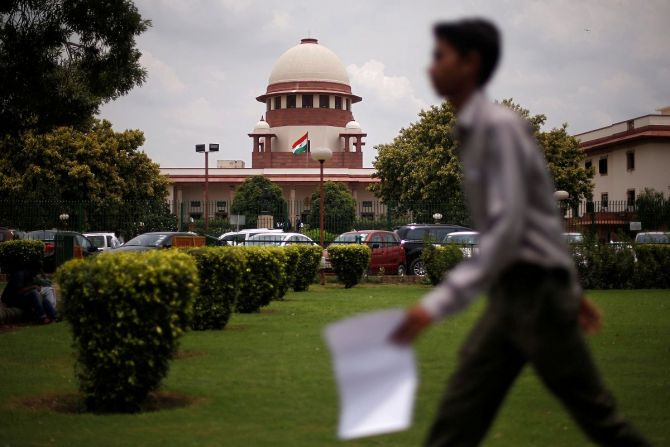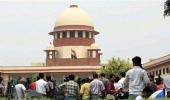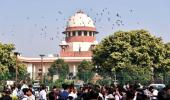The Supreme Court, examining whether states can sub-classify Scheduled Castes and Scheduled Tribes for grant of quota inside quota, on Wednesday said all SCs and STs may not be homogeneous in terms of their sociological, economic, education and social status.

"They (SCs and STs) may be a class for a certain purpose. But, they may not be a class for all the purposes," a seven-judge Constitution bench headed by Chief Justice DY Chandrachud observed while hearing as many as 23 petitions on the issue.
The top court is hearing references to revisit a five-judge Constitution bench judgment of 2004 in the case of 'EV Chinnaiah vs State of Andhra Pradesh' in which it was held that SCs and STs are homogeneous groups and hence, states cannot further sub-classify inside SCs and STs to grant quota inside quota for more deprived and weaker castes in these groups.
"Therefore, there is homogeneity in the sense that each one of them belongs to the Scheduled Castes. But your argument is that there is no homogeneity either in terms of the sociological profile, economic development, social advancement, education advancement.
"There is heterogeneity in terms of past occupation... social status and other indicators may be different for different castes inside the Scheduled Castes. So, the degree of social and economic backwardness may vary from one person or caste to another," said the bench, also comprising justices B R Gavai, Vikram Nath, Bela M Trivedi, Pankaj Mithal, Manoj Misra and Satish Chandra Mishra.
Solicitor General Tushar Mehta, appearing for the Centre, opposed the findings of the Chinnaiah judgment and said it disempowered the State to frame appropriate policy by sub-classifying the zone of reservation appropriately and diminishes the constitutional guarantee of equality of opportunity.
"The central government is committed to the declared policy of reservation for backward classes as a measure of affirmative action to bring equality to those who have suffered hundreds of years of discrimination," he said.
At the outset of the second day proceedings, senior advocate Kapil Sibal argued in favour of the states being empowered to sub-classify SCs and STs to ensure substantive equality among the deprived classes.
"In 21st century, we are talking about equality for those who have been humiliated and deprived for centuries," he said.
Assailing the 2004 judgment, Sibal said it wrongly construed Scheduled Castes as a homogeneous group.
The assumption that SCs represent a homogeneous group was not based on "factual data" and "analysis".
"Actually homogeneous nature of all the entries (of castes) is for the purposes of designation. They are homogeneous in the sense that each one of them is a Scheduled Caste but your argument is that there is no homogeneity either in terms of the sociological profile, economic development etc," the CJI said.
Sibal said Punjab has nearly 32 percent SC population and the state cannot be barred from making special arrangements to support the weakest among the weaker section of society.
The bench hailed the Constitution framers for not prescribing any qualification for several entitlements like owning properties and contesting elections.
"Our Constitution was the first in the world which did not make education as the condition precedent for with regards property, education, gender. It was an article of faith and a very visionary provision. Ours was the first Constitution which did not make the right to hold elections or contest elections conditional on gender, property...," the CJI said.
Former attorney general KK Venugopal, appearing for one of the states, said unequals cannot be treated equally if the State wants to attain substantive equality among all classes of citizens.
Several lawyers including Attorney General R Venkataramani, Rakesh Khanna, Salman Khurshid, Siddharth Luthra and Gopal Sankaranarayanan also argued in the case. The hearing will resume on Thursday.
On Tuesday, the top court said it will examine the validity of its 2004 judgment holding states do not have the power to further sub-classify SCs and STs for grant of quotas.
It made clear that it will not get into the arguments related to the quantifiable data which led the Punjab government to provide for a 50 per cent quota inside the quota.
Of the 23 petitions, the lead one is filed by the Punjab government challenging the 2010 verdict of the Punjab and Haryana high court.
The high had struck down Section 4(5) of the Punjab Scheduled Castes and Backward Classes (Reservation in Services) Act, 2006, which provided 50 per cent quota and the first preference to 'Valmikis' and 'Mazhabi Sikhs' castes in public jobs within the SC quota.
It had held the provision as unconstitutional on ground it violated a five-judge Constitution bench judgment of 2004 of the Supreme Court in the Chinnaiah case.
The Chinnaiah judgment had held any 'sub-classification' of SCs would violate Article 14 (right to equality) of the Constitution.
The 2004 verdict had stated that only Parliament, and not state legislatures, can exclude castes deemed to be SC from the Presidential List under Article 341 of the Constitution.
The top court is examining questions whether sub-classification inside the SC and ST categories be permitted like in the case of other backward classes (OBCs) and if the state assemblies are competent to introduce laws empowering the states to undertake this exercise.
The Punjab government, in 2011, had approached the top court assailing the high court's verdict, saying the apex court's 2004 judgment was not applicable to it.
Taking up the plea of the Punjab government, a five-judge bench headed by Justice Arun Mishra (since retired), on August 27, 2020, differed with the Chinnaiah judgment and referred it for adjudication by a larger bench of seven judges or more for an authoritative pronouncement.
In central government-funded higher education institutions, 22.5 percent of available seats are reserved for SC and 7.5 per cent for ST students.
The same yardstick is applied in the case of public employment as well.
In Punjab and Haryana, there is no ST population.
The Centre on Wednesday supported in the Supreme Court the sub-classification of Scheduled Castes and Scheduled Tribes for grant of quota inside quota, saying it is committed to the reservation policy as an affirmative action for those who suffered ”hundreds of years of discrimination”.
Advancing the arguments, Solicitor General Tushar Mehta, appearing for the Centre, opposed the EV Chinniah judgment and said, ”The sub-classification furthers the actual purpose behind reservations.”
”It is submitted that the legitimate state aim behind reservations is to support the backward classes who have had a history of discrimination of centuries and aiming to provide equality of opportunity,” the top law officer said.
The Chinnaiah judgment had held that any 'sub-classification' of the Scheduled Castes would violate Article 14 (right to equality) of the Constitution.
The 2004 verdict had stated that only Parliament, and not state legislatures, can exclude castes deemed to be SC from the Presidential List under Article 341 of the Constitution.
The law officer said the 2004 judgment disempowered the states to frame appropriate policy by sub-classifying the zone of reservation appropriately and diminished the constitutional guarantee of equality of opportunity.
”The central government is committed to the declared policy of reservation for backward classes as a measure of affirmative action to bring equality to those who have suffered hundreds of years of discrimination,” he said.
The solicitor general, in his written submissions, referred to various judgments and provided several propositions for the court's considerations.
”The concept of equality of opportunities operates at a dual level -- between open category and backward classes -- and secondly, it has to operate even within the backward classes inter-se.
"This bundling together of SC/STs by E V Chinnaiah Vs State of AP... which disempowers the state to frame appropriate policy by subclassifying the zone of reservation appropriately, diminishes the constitutional guarantee of equality of opportunity.
”It is stated that the lack of sub-classification perpetuates the zone of inequality within the reserved category and estops the state from framing appropriate policy in this regard,” the Centre said.
The central government said the Constitution permits reservations at the level of higher education, entry-level in the government service sector and promotion in the government services.
”It may also be noted that the reservation benefits available are limited in nature. The State can only provide for a limited number of seats in government higher education institutions and posts in the government services which are reserved. The said seats and the posts are even otherwise a scare commodity and therefore required to be re-distributed rationally,” it said.
In order to achieve the actual objective behind reservations, rationalisation is key and proliferation and deepening of the reservation benefits are necessary, it said.










